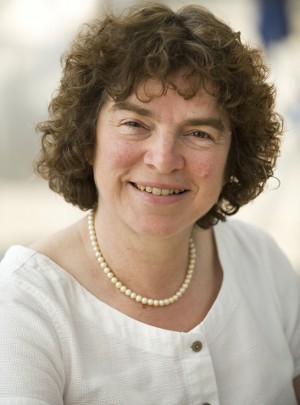Institute researcher awarded Brain Prize

The Grete Lundbeck European Brain Research Foundation announced today that The Brain Prize 2012 is jointly awarded to Professor Karen Steel from the Wellcome Trust Sanger Institute and Professor Christine Petit from College de France:
‘for their unique, world-leading contributions to our understanding of the genetic regulation of the development and functioning of the ear, and for elucidating the causes of many of the hundreds of inherited forms of deafness’.
Inherited conditions render one in a thousand children deaf at birth, and cause as many again to become deaf before maturity, leading to delay or failure in the acquisition of speech, and frequently to disadvantages in communication and learning. Genetic anomalies also contribute to many age-related and progressive forms of hearing loss. About one-tenth of the population in the developed world suffers from significant hearing impairment, which has an enormous impact on people and on society.
Professor Steel and Professor Petit are at the forefront of efforts to understand the molecular mechanisms of the specialised hair cells in the inner ear, whose extraordinary sensitivity to mechanical stimulation underpins the senses of hearing and balance.
“It is a great surprise and a tremendous honour to be jointly awarded the 2012 Brain Prize. The support from The Grete Lundbeck European Brain Research Foundation will help us forge closer contacts with Danish neuroscientists and push forwards our understanding of the molecular basis of deafness.”
Professor Karen Steel from the Wellcome Trust Sanger Institute
Professor Steel is the Principal Investigator for the Genetics of Deafness programme and founder of the Mouse Genetics Programme at the Sanger Institute. She has pioneered the use of mouse models, starting with her painstaking description of the characteristics of mutant mice with disorders of balance and hearing. Karen Steel is internationally recognized for her generous and altruistic approach to science.
These two researchers, at the peak of their productivity and influence, are international leaders in the field of hereditary deafness. The prize lectures and award ceremony will take place 9th May in Copenhagen, Denmark. The Prize will be presented by The Queen of Denmark, Margrethe II of Denmark.
“Together, the work of these two Europeans scientists illustrates the value and power of interdisciplinary approaches in neuroscience, and the way in which cutting-edge fundamental research is needed to understand complex clinical problems and to accelerate benefit for patients. We are delighted that The Brain Prize for the best of European neuroscience goes, in its second year, to two women scientists. We are sure that the award will be applauded by female researchers around the world, and by all those who are concerned that young women are given every encouragement to consider careers in science.”
More information
Selected websites
Grete Lundbeck European Brain Research Prize
Grete Lundbeck European Brain Research Prize – THE BRAIN PRIZE – is awarded by Grete Lundbeck European Brain Research Foundation, a charitable, non-profit organization founded by the Lundbeck Foundation. The Prize and the Foundation are both named after Grete Lundbeck, visionary founder of the Lundbeck Foundation.
The Wellcome Trust Sanger Institute
The Wellcome Trust Sanger Institute is one of the world’s leading genome centres. Through its ability to conduct research at scale, it is able to engage in bold and long-term exploratory projects that are designed to influence and empower medical science globally. Institute research findings, generated through its own research programmes and through its leading role in international consortia, are being used to develop new diagnostics and treatments for human disease.
The Wellcome Trust
The Wellcome Trust is a global charitable foundation dedicated to achieving extraordinary improvements in human and animal health. We support the brightest minds in biomedical research and the medical humanities. Our breadth of support includes public engagement, education and the application of research to improve health. We are independent of both political and commercial interests.


